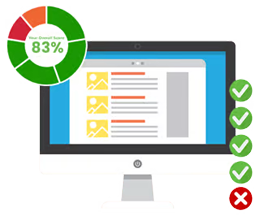Manage Your Domain or Outsource?

Your domain name is the unique address that tells the servers and the internet at large where to find your website and emails. Because of this you want to be on top of any renewals, security, and Nameservers. It is a crucial part of any online presence, and you want to ensure that it is properly managed, either by yourself or someone you trust.
What Does Managing a Domain Name Involve?
The main things that managing a domain name involves are:
Registering and renewing domains – Making sure that the domain name is properly registered with a domain registrar and ensuring that it gets renewed for each billing period you want to keep it for.
Managing Nameservers – The nameservers are the server/s that are handling the DNS for your domain and ensures that any traffic (be it email or website browsing) actually reaches you and doesn’t get lost.
Domain security and privacy – Maintaining secure ownership of your domain means mitigating the risks of nameserver hijacking. This is when your nameserver is compromised and is redirecting traffic to a malicious service, instead of your own website.
Handling technical issues – Because the domain name is the address to your website, and it has multiple servers it needs to talk to, technical issues can occur. It is helpful if the person managing your domain understands both how these issues occur and what the fix is.
The Case for Managing Your Own Domain
Pros
There are some great reasons for managing your own domain if you are so inclined. It allows you:
- Full ownership and control over everything.
- Immediate access in case you need to make changes.
- Lower costs from not needing to pay someone to do it.
- Gives you a better understanding of your digital assets.
Cons
There are also some excellent reasons that you may choose NOT to manage your own domain, including:
- The technical learning curve to understand how everything works.
- Missing renewals and letting the domain lapse.
- Misconfigurations can have a serious financial impact on your business.
- You are fully responsible for the security and troubleshooting of issues.
- Less familiarity with the renewal or update process if rules change.
The Case for Paying Someone to Manage It
Pros
Paying someone else who has a lot of experience and knowledge with domain management is particularly helpful if you are non-technical or time-poor. It provides you with:
- Peace of mind that someone is handling the renewals, setup, and issues that crop up.
- Expert configuration.
- Reduced risk of downtime or other errors.
- More familiarity with updates and changes to rules around domains.
Cons
The downsides of having someone else manage your domain for you include:
- Ongoing service fees will lead to a higher long-term cost.
- You have less direct access and control.
- You are dependent on a third-party.
Factors to Consider When Deciding
The things to weigh up when making the decision about what is right for you are:
Your technical confidence and knowledge – Do you feel as though you could comfortably understand and manage all the moving parts to your domain? If an issue arises do you feel as though you could fix it?
How critical is the domain to your business – If you have your emails and website on the domain, what will happen if something stops working? A business that is mostly word of mouth and phone calls will have far less problems than a big eCommerce site who gets most of their sales through their website.
Budget and willingness to pay for support – If you are managing your own domain you can expect to pay between $10-25 per year for a .com.au domain. Paying someone to manage your domain name for you can add another $10-20 to the yearly cost. When doing your budget, you should also think about how either choice will cost or save you time and any financial implications of a misconfiguration.
Trust in your third-party provider – How much trust do you have in the person or business managing your domains for you? If they’re an employee, think what would happen if they left the company. If you’re paying a business to manage it, ensure that they have good reviews and are communicative.
Best Practices for Domain Management
Regardless of if you’re planning on managing your own domain, or paying someone to manage it for you, there are some best practices that you should follow.
Always keep your domain registered in your own name – Make sure that your domain is tied to yourself or your business as an entity. This means that you have ownership of it and can move around the management much more easily if needed. We always make sure that your domain is registered under your name with us listed as the technical contact to receive notifications and renewals.
Use a reputable registrar or reseller – Because your domain is often a critical part of your business you want to make sure that everyone with any kind of control over it has a good reputation. You want one that provides full DNS access and is separated from your website hosting. We are a registered reseller and have domain management and website hosting as two different services, allowing for clients that want to manage their own domains or move their hosting away from us.
Set up auto-renewal and monitor expiry dates – Keeping an eye on when your domain is up for renewal means you know when to expect another bill whilst having auto-renewal set up means that you don’t risk losing your domain due to expiry. As a management company we send out invoices six weeks in advance of the renewal date to give you ample time to pay for the next two years. If it still hasn’t been paid when the renewal date is two weeks away, we follow up with an email and phone call to make sure you don’t lose your domain.
Maintain access to your domain registrar account and email – Because the email address is what registrars use to contact you as well as verify your account you need to make sure that you always have that access. Losing that can make it incredibly difficult to retrieve your domain if changes are required or it lapses. We ensure that we have consistent access to our management account and that any information regarding your domain is passed on to you. We can also supply you with DNS logins on request.
Keep login credentials secure and up to date – Make sure that your passwords are strong and haven’t been compromised. Password security tips apply here with suggestions like having a different password per service and having a mix of uppercase, lowercase, numbers, and special characters. Other ways to ensure good security is through Two-Factor Authentication, requiring you to input a code that you access through an app or that you receive via email or text.
*****
The choice to manage your own domain or pay someone else to do it for you comes down to what works best for you and your business. If you are a more technologically savvy person who likes to have full control over your digital assets, then managing your domain yourself may be the way for you. If, on the other hand, you prefer the set-it-and-forget-it approach where you can spend your time and energy on the side of your business you know you’re good at, then paying someone to manage it for you will save you time and money in the long run.
Do you want someone else to manage your domains for you?




